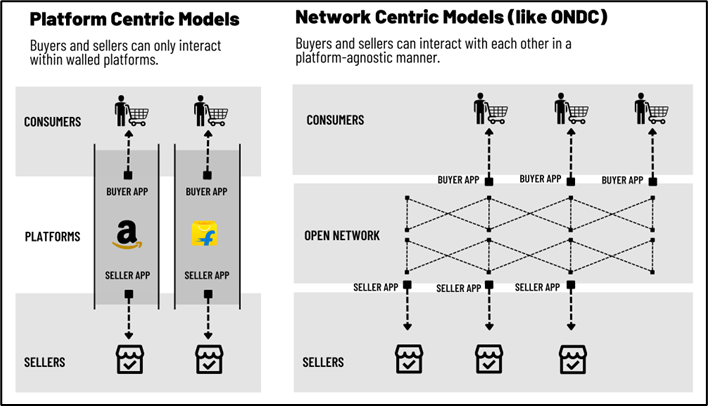Mains Daily Question
May 15, 2023
The Open Network for Digital Commerce (ONDC) is poised to transform the Indian e-commerce service industry. Comment. Also, highlight the challenges that can come during such a transformation.
Approach:
Introduction: Define Open Network for Digital Commerce (ONDC) and its current Indian context.
Body: Explain why it is poised to transform the Indian e-commerce service industry. Present the challenges that are fraught during such a transformation
Conclusion: Provide some implications for the future of ONDC and Indian e-commerce.
Answer:
ONDC (Open Network for Digital Commerce), is a non-profit initiative by the Government of India to democratize e-commerce and empower small and medium enterprises (SMEs) and micro-entrepreneurs. ONDC is currently live in several cities and domains in India, such as food, grocery, fashion, electronics, etc., and has over 35,000 sellers on the network.
This is at a nascent stage and aims to provide a seamless shopping experience for buyers across categories, with a unified checkout and payment system as can be manifested from the below diagram.
ONDC is poised to transform the Indian e-commerce service industry due to the following:
- Interoperability and data sharing: reducing the dependency on a few dominant players (like Flipkart and Amazon). This will foster innovation and competition, leading to better quality and lower prices for consumers.
- Empower small and medium enterprises (SMEs) and local retailers: by providing them access to a broader customer base and a range of services such as logistics, payments, and marketing. This will boost their income and create more employment opportunities.
- Promote inclusiveness and diversity: by ensuring that all segments of society, especially women, rural areas, and marginalized groups, can benefit from the digital commerce ecosystem. This will enhance social welfare and economic development.
- Facilitate compliance with the regulatory framework and consumer protection norms: by establishing a transparent and accountable system of governance and dispute resolution. This will increase trust and confidence among all stakeholders and prevent unfair trade practices.
- Leverage the existing digital infrastructure: such as Aadhaar, UPI, GSTN, GeM, etc., to create a seamless and secure e-commerce experience for sellers and buyers. This will reduce the cost and complexity of doing business online.
- Support the vision of Atmanirbhar Bharat: by creating a homegrown and indigenous e-commerce model that reflects the needs and aspirations of Indian consumers and businesses. This will enhance India's global competitiveness and strategic autonomy.
Some of the challenges that are fraught during such a transformation and measures that can be taken:
- Awareness and education: ONDC aim to bring millions of small merchants and rural customers online, but many of them may lack the awareness, skills, or resources to join the network.
- The government must run a massive campaign to inform and educate them about the benefits and opportunities of the network, as well as provide them with technical support and guidance.
- Interoperability and standardisation: ONDC will have to ensure that its network is interoperable with existing e-commerce platforms, payment systems, logistics providers, and other stakeholders.
- These require some common standards and protocols for product discovery, cataloguing, vendor matching, order fulfilment, customer service, and dispute resolution.
- Data privacy and security: ONDC will have to safeguard the data and privacy of its users from potential breaches, misuse, or manipulation.
- This requires compliance with the upcoming Personal Data Protection Bill and other relevant laws and regulations to establish trust and transparency among its users and partners.
- Competition and innovation: ONDC will have to compete with the dominant players in the e-commerce market, such as Amazon and Flipkart, who have a large customer base, deep pockets, and advanced technology.
- ONDC shall aid to foster innovation and differentiation among its network participants, who may offer similar products or services.
- Regulation and governance: ONDC will have to navigate the complex and evolving regulatory landscape of e-commerce in India, which involves multiple ministries, departments, agencies, and courts.
- The government must make its governance structure fair, accountable, and representative of its diverse stakeholders.
- Scalability and sustainability: ONDC will have to scale up its network to reach its ambitious targets of 900 million buyers and 1.2 million sellers in five years while achieving a gross merchandise value of $48 billion.
- This requires that the Government have to ensure that its network is sustainable in terms of financial viability, environmental impact, and social responsibility.
The government must focus on adopting open standards, ensuring data privacy and security, encouraging participation of small and medium enterprises, fostering a competitive and fair environment, and leveraging emerging technologies for e-commerce. ONDC could enable India to compete with global players like Amazon and Flipkart and foster innovation and collaboration among different stakeholders.


